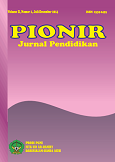MANAJEMEN PENGEMBANGAN PENDIDIKAN KETERAMPILAN DALAM ISLAM
DOI:
https://doi.org/10.22373/pjp.v10i3.12179Keywords:
Management, Skills Education.Abstract
Skills education is a necessity that must be owned by individuals in the era of globalization. This is because life skills are prioritized over knowledge, so an effective management and development system is needed. This paper aims to analyze the management of skills education development in Islam. This research uses a qualitative approach with a literature study method. Reference material is a tool for analyzing and testing the validity of the data. The results of this study indicate that the life skills needed by human resources are (1) general life skills (personal skills, rational thinking skills, social skills, and interpersonal skills) and (2) specific life skills (academic skills and vocational skills). Furthermore, efforts that must be made in developing skills education include reorienting learning, providing vocational skills and reforming educational institutions in terms of management and learning culture. Finally, extracurricular design as an effort to develop student skills education.
References
Asmani, Jamal Ma’mur. (2012). Pendidikan Berbasis Keunggulan Lokal. Yogyakarta: Diva Press.
Assingkily, Muhammad Shaleh. (2021). Penelitian Tindakan Kelas (Meneliti dan Membenahi Pendidikan dari Kelas). Medan: CV. Pusdikra Mitra Jaya.
Departemen Agama. (2005). Pedoman Integrasi Life Skill dalam Pembelajaran. Jakarta: Dirjen Kelembagaan Agama Islam.
Departemen Pendidikan Nasional. (2007). Pendidikan Kecakapan Hidup untuk Pencegahan HIV dan AIDS. Jakarta: Pusat Pengembangan Kualitas Jasmani.
Hamalik, Oemar. (1995). Kurikulum Pembelajaran. Jakarta: Bumi Aksara.
Ilahi, Mohammad Takdir. (2016). Pembelajaran Discovery Strategy dan Mental Vocational Skill: Teori Inspiratif bagi Para Pembelajar. Yogyakarta: Diva Press.
Mulyono. (2008). Manajemen Administrasi dan Organisasi Pendidik. Yogyakarta: Ar-Ruzz.
Mursi, Abdul Hamid. (1999). SDM yang Produktif: Pendekatan Al-Qur’an dan Sains. Jakarta: Gema Insani Press.
Saroni, Mohammad. (2017). Sertifikasi Keahlian Siswa: Strategi Mempersiapkan dan Meninkatkan Sumber Daya Manusia Secara Profesional. Yogyakarta: Ar-Ruzz Media.
Soedijarto.(1989). Menuju Pendidikan Nasional yang Relevan dan Bermutu. Jakarta: Balai Pustaka.
Syafaruddin, et.al. (2020). “Manajemen Pembelajaran Pendidikan Agama Islam di SDIT Bunayya Pandan Kabupaten Tapanuli Tengah” AULADUNA: Jurnal Pendidikan Dasar Islam, 7(1). http://repository.uinsu.ac.id/id/eprint/8966.
Usman, Moh. Uzer & Lilis Setiawati. (1993). Upaya Optimalisasi Kegiatan Belajar Mengajar. Bandung: Remaja Rosdakarya.
UU No. 20 Tahun 2003 Tentang Sistem Pendidikan Nasional, Pasal 3.
Oviana, W., & Rijal, F. (2021). The Role of Islamic Higher Education Institution in Developing Students' Character Value. AL-ISHLAH: Jurnal Pendidikan, 13(1), 570-580.
Downloads
Published
Issue
Section
License
- Authors retain copyright and grant the journal right of first publication with the work simultaneously licensed under a Creative Commons Attribution License that allows others to share the work with an acknowledgment of the work's authorship and initial publication in this journal.
- Authors are able to enter into separate, additional contractual arrangements for the non-exclusive distribution of the journal's published version of the work (e.g., post it to an institutional repository or publish it in a book), with an acknowledgment of its initial publication in this journal.
- Authors are permitted and encouraged to post their work online (e.g., in institutional repositories or on their website) prior to and during the submission process, as it can lead to productive exchanges, as well as earlier and greater citation of published work (See The Effect of Open Access).

